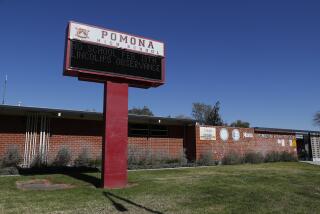USC assistant Beth Burns wins wrongful-termination lawsuit against San Diego State
Former San Diego State women’s basketball coach Beth Burns won her wrongful-termination trial against the university Wednesday, receiving a $3.35-million judgment from a San Diego Superior Court jury for whistle-blower retaliation after complaining about potential Title IX violations.
Burns was fired in April 2013, a month after her team won a school-record 27 games and nine months after SDSU granted her a contract extension through 2016-17 that paid her $220,000 a year plus benefits and bonuses. She was out of work for a year, then took a job as an assistant coach at USC for $150,000 a year.
SDSU ultimately identified two central reasons for her termination – a video from a February 2013 home game in which Burns elbowed assistant coach Adam Barrett, seated to her immediate right, after a defensive lapse; and an internal investigation that chronicled an alleged “history” of mistreating subordinates.
Burns, 57, characterized the elbow as incidental contact on a crowded bench, and her attorneys called the athletic department probe “a sham … to find a way to fire Coach Burns.” She sued for breach of contract, gender discrimination and whistle-blower retaliation for lodging complaints about gender equity – saying her career, and life, have been turned upside down – and asked for damages totaling nearly $9 million.
“If it was a movie, I’d walk out,” Burns told the jury early in the month-long trial. “It’s hard to believe that it’s your own life.”
The gender discrimination claim was dropped shortly before the trial after Judge John Meyer denied a motion that would have allowed Burns to compare her firing to those of SDSU football coaches Tom Craft and Chuck Long, both of whom were paid the balance of their contracts. The breach of contract claim was dropped last Sunday, the day before closing arguments, in what Burns’ attorneys described as an effort to consolidate the case and streamline jury instructions.
It also might have been a tactic to force the jury into an all-or-nothing decision and eliminate its ability to deliver a compromise verdict – finding for Burns in breach of contract, where monetary rewards likely would be in the hundreds of thousands of dollars, but not for whistle-blower retaliation, where punitive damages could quickly climb into the millions.
The result was a jury form with seven questions, all of which had to be answered in the affirmative for Burns to prevail. Even if the jury found that Burns had made what are called “protected disclosures” of potential Title IX violations and they were a contributing factor to her termination, it also had to answer yes to whether she would have been fired “anyway for legitimate independent reasons.”
California State University attorney David Noonan likened it to “running the gauntlet.”
Both sides made it clear that SDSU was not on trial for Title IX, the 1972 legislation that guarantees equal opportunity and treatment of the sexes in entities, like universities, that receive federal funding.
Instead, Burns claimed she was fired for complaining about equal treatment of the men’s and women’s basketball program. Twelve gender equity “communications” were identified in the jury instructions, ranging from game-day giveaways to ticketing to equipment, and the jury was tasked with determining whether they were made in good faith, constituted protected disclosures and were a factor in her dismissal.
Burns was in her second eight-year stint at SDSU, twice transforming a moribund program into a national contender that reached the NCAA tournament seven times and went as far as the Sweet 16 in 2010. She remains the school’s winningest women’s basketball coach.
“San Diego State is trying to convince you that everything about Coach Burns angered them, except for her complains about gender equity,” Ed Chapin, her lead attorney, said in closing arguments. “The question is not whether she’s perfect. She doesn’t claim she is. The question is if she would not have complained would San Diego State have fired her anyway.
“The answer to that is a resounding no.”
Noonan, like Chapin one of San Diego’s most veteran and respected attorneys, began his 2½-hour closing argument by saying Burns treated people around her “like dirt.” The whistleblower retaliation claim, Noonan said, “is an excuse to wash away her years of mistreatment of subordinates and staff. Then she doubles down on that … She seeks to parlay that into a multi, multi-million dollar reward.”
mark.zeigler@sduniontribune.com
Twitter: @sdutzeigler
ALSO
Former USC linebacker Lamar Dawson sues NCAA and Pac-12
UCLA report: Jim Mora will give one running back more work against Arizona
JuJu Smith-Schuster and Ronald Jones II, USC’s most explosive players, haven’t been this season
More to Read
Get our high school sports newsletter
Prep Rally is devoted to the SoCal high school sports experience, bringing you scores, stories and a behind-the-scenes look at what makes prep sports so popular.
You may occasionally receive promotional content from the Los Angeles Times.






